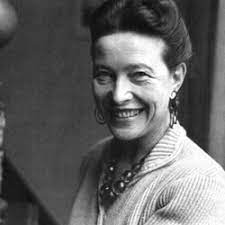|
Thanks to Manon Garcia, I came across an interview Betty Friedan conducted with Beauvoir in 1975. I found that it illuminated certain dialogues we are still having on the limits and purpose of feminism, in particular with reference to domesticity. Beauvoir, 26 years after she wrote the Second Sex, has not given up on the idea that domestic work was a drudgery impose on married women to keep them subordinated to men . Friedan, who once claimed that 'no woman gets an orgasm from shining the kitchen floor' nonetheless fights back against Beauvoir in her attempt to uphold the values of marriage, family and motherhood. 'A dialogue between Simone de Beauvoir and Betty Friedan'. 14 June 1975, Saturday Review Reprinted in Betty Friedan, It Changed My Life: Writings on the Women's Movement (New York: Random House, 1976), pp. 304-16. Friedan travelled to Paris to interview Beauvoir in her home. She felt that the feminist movement was floundering, and that an alliance between the most famous feminists in France and the United States might help revive it. The feminist movement in the States needed to be unified, Friedan thought, because it was loosing strength due to the dissociation of some 'extreme' feminists, possibly 'agents provocateurs' who want to make 'a political ideology out of lesbianism' and are 'down with men, childbearing and motherhood'. One way to bring power back to 'non-extremist' feminism, Friedan thought, is by arguing for a minimum wage for housework. Does Beauvoir agree, she wonders? Beauvoir strongly disagrees. And she feels that the problem with feminism is a failure of widespread societal change. Tokenism, and individual women breaking the glass ceiling isn't going to bring that about. She thinks that in many ways, women are better off taking jobs as teachers than they are becoming presidents of universities as this is more likely to bring overall change. Friedan asks 'how are they to eat' in response to Beauvoir arguing that women do not need to take the top jobs. In an interview conducted four years later with Alice Jardine, she comes back to that point: Yes, that "we want to be just like men," that is, men as they are today, when in truth we need to change the society itself, men as well as women, to change everything. It is very striking in Betty Friedan: What she wants is for women to have as much power as men do. Obviously, if you are truly on the left, if you reject ideas of power and hierarchy, what you want is equality. Otherwise, it won't work at all. (A. Jardine. Interview with Simone de Beauvoir. Signs, 1979 5:2. 224-236, 226) She doesn't want women to become what men are: she wants both men and women to change. This means refusing to play the game, and that includes the 'star system': many younger feminists, she says, are not signing their names to their writings. Beauvoir gives an example of what a universal feminist movement can look like: the pro-abortion movement in France. It worked because it engaged women from all classes: peasant, working class, bourgeoises. When Friedan proposes the minimum wage for housework idea, Beauvoir rejects it immediately: it would reinforce the division of the spheres. It would make it much harder to bring the sort of change that doesn't regard women as cleaners first. Friedan objects that the women who currently do this work and have been doing it for years should nonetheless be rewarded for it, but Beauvoir doesn't budge. She now says that women should not be offered the choice of staying home to raise children, 'precisely because if there is such a choice, too many women will make that one. It is a way of forcing women in a certain direction.' She gives a Chinese example of communal washing and socks darning, where every man, woman and children get together to darn socks - not necessarily their own. Friedan opposes a 'pluralistic situation of real options' that takes into account the fact that 'the sense of individual family and the values of motherhood are so strong in people that I don't see any viable or even valuable political attempt to wipe them out. If people should choose a communal life-style such as you spoke of, that possibility should soon be open to them'. Beauvoir replies that we need to destroy the 'myth of the family and the myth of maternity and of the maternal instinct'. But, Friedan asks, shouldn't women be paid for their work? Why women? asks Beauvoir, why not get both men and women and indeed everyone in the community to share the work, and then, why pay in separately? No Gods, No GoddessesFriedan, clearly disappointed, published, in the same issue, a short article where she steps back from Beauvoir (whom she calls throughout 'de Beauvoir'). The piece, entitled 'No Gods, No Goddesses' traces her history with Beauvoir: it was the Second Sex which introduced her to Existentialism (not feminism), but it also caused her to be depressed for years - until she wrote her own book. Friedan then proceeds to deal with her disappointment by launching a number of accusations on Beauvoir. Her disagreements with Friedan are merely a product of her repeating Sartres's Maoism - just as she had once repeated his existentialism. Beauvoir's repudiation of elitism, she says, elevates ' the anonymous working-class woman in the abstract' and her praise of anonymous feminist writings doesn't stop her from collecting her royalties. Also, although she says women should make do with normal teaching jobs so as not to fall into the 'equality with the top men' interpretation of feminism, she herself has had 'exceptionally good jobs' - this is not entirely true as Beauvoir spent a great deal of her life teaching in high schools. Finally, Beauvoir wanting to keep the interview with Friedan down to one hour because she wants to visit Sartre in hospital demonstrates her life-long dependence on a man, which is hypocritical in the light of her rejections of the traditional values of marriage and motherhood. Friedan ends by saying 'I wish her well'.
0 Comments
Leave a Reply. |
AboutThis is where I blog about my new book project (under contract with OUP): a history of the philosophy of the home and domesticity, from the perspective of women philosophers. Archives
March 2024
Categories |
Proudly powered by Weebly


 RSS Feed
RSS Feed